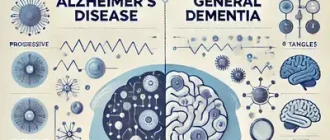Dementia affects millions of people worldwide and can be a difficult and emotional experience for both the patient and their loved ones. However, there are preventative measures that can be taken to reduce your risk of developing dementia. In this blog post, we’ll share 8 practical steps you can take to keep your brain healthy and lower your chances of developing dementia. Let’s dive in!
How to Avoid Dementia
According to recent studies, regular physical activity is one of the best ways to reduce the risk of developing dementia. In addition to exercising, managing blood sugar, blood pressure, and cholesterol levels within recommended limits may also lower the chances of developing this condition. However, there are some risk factors that cannot be controlled.
Reducing stress levels and not smoking are also two simple steps that can help prevent dementia. Furthermore, avoiding vitamin B, vitamin E, and fish oil supplements may also be beneficial.
To maintain brain health, it is important to stay mentally active by constantly engaging in challenging activities, learning new things, and participating in logic games. Getting enough sleep is also essential to support brain function.
Family and friends can also play a role in helping dementia prevention efforts by encouraging healthy habits and regularly checking in with older loved ones to monitor their cognitive health.
It is important to note that dementia is not a sentence and can be prevented with the right measures. By following these tips, it is possible to maintain a healthy brain and reduce the chances of developing dementia.
1. Exercise regularly to improve blood flow and brain health
Regular physical activity is not only good for the body but also helps in improving brain health by increasing blood flow to the brain. According to various studies, staying physically active and exercising regularly can help reduce the risk of developing dementia. Experts suggest that following the recommended guidelines of doing at least 150 minutes of moderate-intensity aerobic activity each week, such as brisk walking or cycling, can be highly beneficial.
One of the most critical factors is to gradually increase the exercise intensity as fitness improves, but at least 30 minutes of daily physical activity is necessary. While there is no set formula for an optimal exercise prescription for brain health, it has been found that cardio exercises can contribute the most to brain health and help in retaining memories.
Apart from reducing the risk of dementia, physical activity also helps in reducing the risk of developing heart disease, stroke, and diabetes. Hence, it is essential to incorporate regular physical activity into our daily routine to maintain good physical and mental health.
In conclusion, exercise is not only beneficial for the body but also for the brain. Regular physical activity helps increase blood flow to the brain and reduces the risk of developing dementia. It is important to adopt a healthy lifestyle and follow the recommended guidelines to maintain good physical and mental health, as it can contribute to reducing the risk of chronic conditions such as dementia in the long run.
2. Maintain a healthy diet
Maintaining a healthy diet is essential in reducing the risk of developing dementia. The MIND diet, which focuses on plant-based foods linked to dementia prevention, encourages eating from ten healthy food groups. Nuts and berries are ideal snacks, as they have been linked to better brain health, particularly blueberries and strawberries. Green, leafy vegetables are also recommended to eat once per day. Managing chronic conditions like high blood pressure and diabetes is also crucial to maintaining a healthy diet.
In addition to reducing the risk of dementia, a healthy diet can also help prevent constipation, which is a prevalent issue for people with dementia. Not eating enough fibre or drinking enough water can cause constipation, so helping the person with dementia maintain a healthy diet and drink plenty of water is crucial.
While a healthy diet is an essential part of reducing the risk of dementia, it is not the only factor. Along with maintaining a healthy diet, regular physical activity, social engagement, and ample sleep can help reduce the risk of developing dementia. It’s important to regularly check in with a doctor to monitor cognitive health and seek further guidance on implementing healthy lifestyle changes.
By following the eight steps to prevent dementia, including maintaining a healthy diet, individuals can take proactive steps to reduce their risk of developing dementia. Family and close friends can also play a vital role in supporting and encouraging healthy lifestyle choices for their loved ones. Remember, dementia is not a sentence, and by making healthy lifestyle changes, individuals can take control of their brain health.
3. Stay mentally active through learning new things and engaging in stimulating activities
Research has shown that engaging in mentally stimulating activities can help reduce the risk of dementia. In order to stay mentally active, experts recommend learning new things and engaging in stimulating activities.
According to the blog “8 Steps to Prevent Dementia,” staying mentally active can include trying logic games and challenges as well as pursuing new hobbies or taking on new challenges. This can include things like learning a new language, taking up an instrument, or trying out a new sport.
4. Get enough sleep to support brain function
Getting adequate sleep each night is essential to support brain function and reduce the risk of developing dementia, according to the latest research. A new blog post highlights the importance of sleep as one of the keys to preventing cognitive decline. It suggests that getting between six to eight hours of sleep per night can reduce the risk of dementia.
5. Try logic games and challenges
Evidence shows that brain games, also known as cognitive training, can be an effective tool in lowering the risk of developing dementia. As mentioned in previous sections, regular physical exercise, a healthy diet, and mental stimulation are vital components in preventing dementia. However, playing logic games and challenges can be a fun and engaging way to keep the mind active and improve cognitive skills.
Studies have shown that mentally stimulating activities increase cognitive reserve, which allows the brain to cope with age-related changes and even delay the onset of dementia. Brain games such as Sudoku, puzzles, crosswords, and even video games can help improve memory, spatial awareness, and decision-making skills.
Experts suggest incorporating brain games into daily routines and gradually increasing the difficulty level to keep the mind challenged. These games can also be played in social settings, which can help improve social interactions and combat loneliness, another risk factor for dementia.
While there is no concrete evidence that brain games prevent dementia, they are a beneficial addition to a dementia prevention plan. However, it is essential to note that brain games should complement other lifestyle changes such as physical exercise and a healthy diet, and not be a substitute for them.
6. Manage chronic conditions like high blood pressure and diabetes
Managing chronic conditions like high blood pressure and diabetes is crucial in preventing and delaying the onset of dementia. In this section, we will explore how to manage these conditions effectively.
High blood pressure, or hypertension, is known to increase the risk of developing dementia. Therefore, it’s essential to keep blood pressure under control. One way to do this is to aim for 130 mm Hg or less. Consulting a doctor and following medication and diet plans is necessary to manage hypertension.
Similarly, having high blood sugar levels increases the likelihood of developing dementia. Diabetics should regularly monitor and manage their blood glucose levels to keep them within the desired range. Eating a healthy diet and engaging in physical activity play a significant role in managing diabetes.
In summary, managing chronic conditions like high blood pressure and diabetes is crucial to prevent and delay the onset of dementia. Regularly visiting a doctor, following medication and diet plans, and engaging in physical activity can help manage these conditions effectively. By taking care of yourself, you can reduce your risk of developing dementia and continue to lead a fulfilling life.
7. Quit alcohol and tobacco use
Quitting alcohol and tobacco is one of the key steps towards preventing dementia, as consumption of these substances has been linked to an increased risk of cognitive decline. As outlined in the previous sections, there are a number of lifestyle changes and habits that can help maintain brain health and reduce the risk of developing dementia.
8. Regularly check in with a doctor to monitor cognitive health
Regularly checking in with a doctor to monitor cognitive health is an important step in preventing and managing dementia. As discussed in the previous sections, proper exercise, diet, mental stimulation, and sleep are all crucial in reducing the risk of developing dementia. However, early detection and treatment are also vital.
During routine check-ups, doctors can administer simple cognitive tests to assess memory, thinking, and language abilities. If any signs of impairment or decline are detected, further evaluations and interventions can be recommended. Additionally, doctors can help manage other health conditions, such as high blood pressure and diabetes, which are associated with dementia risk.
Family and loved ones can also play a role in monitoring cognitive health. They may notice changes in behavior or thinking patterns before a doctor does. By staying vigilant and communicating concerns to medical professionals, steps can be taken to address any potential issues.
It’s important to remember that dementia is not a sentence. With proper care and attention, individuals can maintain their cognitive function and quality of life. Regular check-ups are a key component of this approach. By working with healthcare professionals and loved ones, individuals can take proactive steps towards preventing and treating dementia.
How family and close friends can help
One of the most challenging aspects of caring for a loved one with dementia is ensuring they receive adequate support while also tending to your own needs. Thankfully, there are several things family members and close friends can do to help.
Firstly, offering to spend time with the person living with dementia so family members can take a break is an excellent way to give them a reprieve. Video calls can also be a great way to connect while remaining apart.
Installing door and window alarms and locks can help ensure the safety of your loved one with dementia while allowing them to maintain as much independence as possible.
Encouraging the caregiver to eat nutritiously, exercise, and get sufficient rest is another way to promote self-care. By maintaining good health themselves, caregivers are better equipped to provide quality care.
Involving the person with dementia in activities as much as possible can also be beneficial. Allowing them to do things with the least amount of assistance can help maintain their sense of autonomy.
Lastly, communication is crucial. When speaking with someone diagnosed with dementia, focusing on the things you can still do together can be more productive and positive than what may no longer be possible.
Overall, caring for someone with dementia can be challenging but by working together and providing support, family members and close friends can make the journey more manageable.
Famous people with dementia
It’s no secret that dementia can affect anyone, regardless of their status or wealth. In fact, some famous personalities have been diagnosed with this condition, raising awareness about the importance of early detection and preventive measures.
One such personality is Ronald Reagan, who served as the 40th President of the United States. He was diagnosed with Alzheimer’s disease in 1994, six years after leaving the Oval Office. Despite his diagnosis, Reagan continued to advocate for Alzheimer’s research until his death in 2004.
Rita Hayworth, a Hollywood icon of the 1940s, was also diagnosed with Alzheimer’s disease. Her daughter, Princess Yasmin Aga Khan, became a vocal advocate for the disease after her mother’s death in 1987.
By highlighting the experiences of famous personalities with dementia, we can reduce the stigma surrounding the disease and encourage more people to take preventive measures. While there is no certain way to prevent all types of dementia, adopting healthy habits such as regular exercise, a healthy diet, and mental stimulation can significantly reduce the risk. It’s important to stay informed and consult with a doctor regularly to monitor cognitive health. Remember, dementia is not a sentence, and taking proactive measures can ensure a fulfilling life regardless of the diagnosis.
Conclusion: Dementia is not a sentence
In conclusion, it is important to note that dementia is not a sentence. While there is no certain way to prevent all types of dementia, taking steps to maintain a healthy lifestyle can reduce the risks associated with the condition. As outlined in the previous sections, regular exercise, a healthy diet, mental stimulation and quitting alcohol and tobacco are all effective ways to support brain function and reduce the risk of cognitive decline.
It is also worth mentioning that support from family and close friends can play an important role in helping individuals living with dementia. Good home care, communication tips, and access to resources and support can all contribute to a better quality of life for those affected by dementia.
Finally, it is important to remember that dementia does not discriminate and can affect anyone, including famous people. However, with the right care and support, individuals living with dementia can continue to live fulfilling lives. By following the steps outlined above and seeking medical advice when necessary, we can all take proactive steps to reduce the risks associated with dementia and support those affected by this condition.

About the Author
Reyus Mammadli is the author of this health blog since 2008. With a background in medical and biotechnical devices, he has over 15 years of experience working with medical literature and expert guidelines from WHO, CDC, Mayo Clinic, and others. His goal is to present clear, accurate health information for everyday readers — not as a substitute for medical advice.







